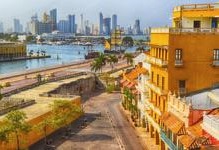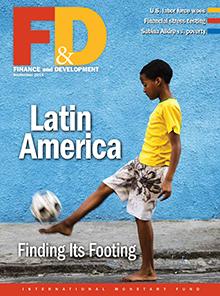
Typical street scene in Santa Ana, El Salvador. (Photo: iStock)
IMF Survey : F&D Magazine Examines Latin America Beset by Slowing Growth
August 27, 2015
- Latin America faces uncertainty after a decade of strong economic growth
- Despite substantial improvement, inequality in the region is still stark
- Corruption and other governance issues can hold back progress
Latin American nations, along with emerging market economies around the world, enjoyed stellar growth between 2004 and 2013, stumbling only briefly during the 2008-09 financial crisis that engulfed the United States and Europe.

Morning scene in Cartagena, Colombia: Latin America is a region of contrasts (photo: Thinkstock)
Regional Outlook
But that rosy performance ended two years ago, “and much of the region is again viewed with a sense of forgone promise,” according to Columbia University Professor José Antonio Ocampo in the September 2015 issue of the IMF’s Finance & Development (F&D) magazine. The sudden deterioration in Latin America’s prospects reflects changing international conditions—primarily a decline in commodity prices and a moderation in the growth of international trade
To regain its footing, Ocampo writes in an issue that explores the situation in Latin America, the region “must undertake reforms to diversify economies and to upgrade technologically its production structure to make it less dependent on the behavior of commodities.”
The sudden erosion in Latin America’s economic situation not only makes for an uncertain economic future, but could also threaten a decade of social progress in the region.

Evening out
Income inequality, for example, has declined in nearly all Latin American countries since the start of the millennium—a contrast to the rest of the world—Tulane University Professor Nora Lustig writes in the latest issue of the quarterly economic journal. Coupled with the surge in economic growth, the reduction in inequality led to a reduction in poverty, especially extreme poverty, in Latin America. Lustig says the change in inequality is mainly the result of more equal distribution of earnings and government transfers.
Despite the improvement in the last decade and a half, inequality remains worse in Latin America than in much of the rest of the world. And the prospect for continued improvement depends on how long the growth slowdown lasts and whether it puts more pressure on low-income or high-income wages, she writes.
Regional challenges
Daniel Kaufmann, president of the Natural Resource Governance Institute, says that ineffective governance remains a major impediment to sustained economic and social improvement in Latin America. He notes that a substantial increase in transparency in economic policymaking has not been accompanied by longer-term governance reforms, especially political and institutional. In the past 15 years, on average, government effectiveness, control of corruption, and voice and accountability have stagnated and regulatory quality and rule of law have deteriorated.
Alejandro Werner, director of the IMF’s Western Hemisphere Department, pinpointed a lack of consumer and business confidence in policymakers and policies during the hard times that have arrived in Latin America. To restore confidence, Werner writes in an F&D column called “Straight Talk,” governments in the region must “clarify the direction of their economic policies and deepen Latin America’s democracies and market institutions.”
Other articles on the region examine the need for Latin American economies to refocus trade policies to encourage global value chain participation; the potential consequences of a large outflow of capital from the region; and what an increase in economic responsibilities beyond inflation control could mean for central banks.
IMF economist Nicole Laframboise examines what the thaw in relations between the United States and Cuba might portend for tourism in the island nation—and for other Caribbean countries.
Also in this issue
The September 2015 issue of F&D also looks at the long-term decline in the labor force participation rate in the United States, which is mainly, though not totally, the result of an aging population in the world’s largest economy.
Another article concludes that the unconventional monetary policy the U.S. Federal Reserve embarked on in the wake of the global financial crisis has had a more noticeable effect on emerging market economies than the more conventional policy in the years preceding the crisis.
The magazine also profiles economist Sabina Alkire, who has devoted her academic life to studying poverty and has developed an index designed to add nuance to the description of poverty beyond the standard definition of earning less than $1.25 day. Alkire’s index factors in such things as health, education and living standards.


